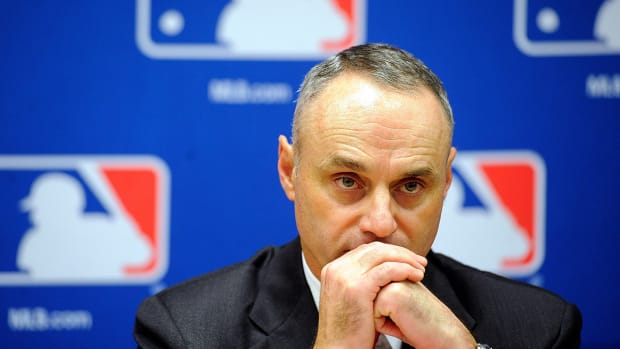For a moment, it appeared baseball's commissioner was taking the pandemic as seriously as he should. But that was a bluff, and the coronavirus called it.
For the first time since Pandemic Baseball began, it appeared Rob Manfred was finally taking seriously the perilous state of his sport.
Hours after Friday’s Cardinals-Brewers game was postponed because two St. Louis players had tested positive for COVID-19, Manfred reportedly told Tony Clark, the head of the players association, that
he would shut down the season if there was another surge of cases or if the players continued not to follow the league’s safety protocols.The coronavirus called his bluff.
By Saturday morning, when it was reported that an additional Cardinals player and three St. Louis staffers tested positive for the coronavirus, it was clear there was a second outbreak in MLB. This one, unlike the fallout in Philadelphia, is completely separate from the Marlins crisis.
Certainly, this would halt the season, right? To quote another incompetent leader with no grasp of how to handle the pandemic: “Wrong.”
Less than a day later, Manfred rescinded his threat in an interview with ESPN’s Karl Ravech.
"We are playing," Manfred told Ravech. "The players need to be better, but I am not a quitter in general and there is no reason to quit now. We have had to be fluid, but it is manageable."
So, instead of taking responsibility for implementing questionable health and safety protocols, the clueless commish continues to fault the players. Sure, the Marlins players do deserve some of the blame. A source told Sports Illustrated’s Tom Verducci that the initial information in MLB’s investigation into the origin of the team’s outbreak is leading the league to believe there was “clearly a breakdown with adherence to the health and safety protocols away from the ballpark.”
But, if they do not believe they are at risk of contracting the virus there is little to deter them from disobeying the rules away from the field. After all, they high-five and spit and hug during games without consequence. Why would they think Manfred would come down any harder for what they did away from their team?
Now, instead of actually pulling the plug on the season—or at least waiting to make a decision—Manfred completely reversed course.
On Monday, as we were realizing the scale of the Miami outbreak, Manfred so aptly was compared to those cardboard-cutout fans attending big-league games. Now we know he’s made not of cardboard but playdough: He’s malleable.

This isn’t the first time in the past year alone that we’ve seen Manfred promise to go nuclear only to back off.
• He offered the Astros players immunity from discipline in exchange for honest testimony during his investigation into the team’s illicit sign-stealing scheme. It was a compromise he made willingly after he promised severe punishment for those who steal signs electronically. In the report about the scandal, he chose to call out the team’s former general manager Jeff Luhnow, manager A.J. Hinch, former bench coach Alex Cora and retired designated hitter and then-Mets manager Carlos Beltrán, but that did not extend to the active players.
• At one point during dragged-out negotiations with the MLBPA, he vowed not to pay the players their full prorated salaries during an abbreviated 2020 season unless they agreed to play just 50 games. He later unilaterally implemented a 60-game schedule and relented on how much the players would be paid.
• He made clear in the 113-page operations manual that on-field confrontations this year would not be tolerated, and those who engaged in such altercations would face especially strict repercussions. The document reads: “Violations of these rules will result in severe discipline consistent with past precedent, which discipline shall not be reduced or prorated based on the length of the season.” Dodgers pitcher Joe Kelly, who targeted multiple Astros hitters with pitches, was suspended for eight games, which was not prorated, following the parameters outlined in the manual. However, he refrained from disciplining any of the other players who participated in the fracas—despite indicating in the document that they would be punished severely.
It’s clear we cannot trust Manfred to do his job. If we could, any one of these things would have happened by now: 1) Baseball would be playing right now in at least one “bubble” city; 2) It would be required for play to be suspended at least five days for any team when two or more players test positive within two days of one another, per the recommendation of Emory epidemiologist Zach Binney; 3) Baseball would have been shut down, at least temporarily.
Instead, we’re left with veteran players, coaches and managers tasked with making sure everyone adheres to the protocols. After what went down with the Marlins, when 30-year-old shortstop Miguel Rojas and other players decided in a group-text chain to play Sunday despite signs of an imminent outbreak, we know that won’t work.
If Manfred isn’t going to shut it down, baseball must do more than stay the current course. Baseball needs public health officials to be the ones calling the shots, not team members or a commissioner, employed by the owners, who lacks the chutzpah to use his authority to make the season as safe as possible.
Saturday proved Manfred was bluffing the first time it appeared he was taking seriously the dangers of Pandemic Baseball.
But really, we knew that all along.

0 Comments:
Post a Comment